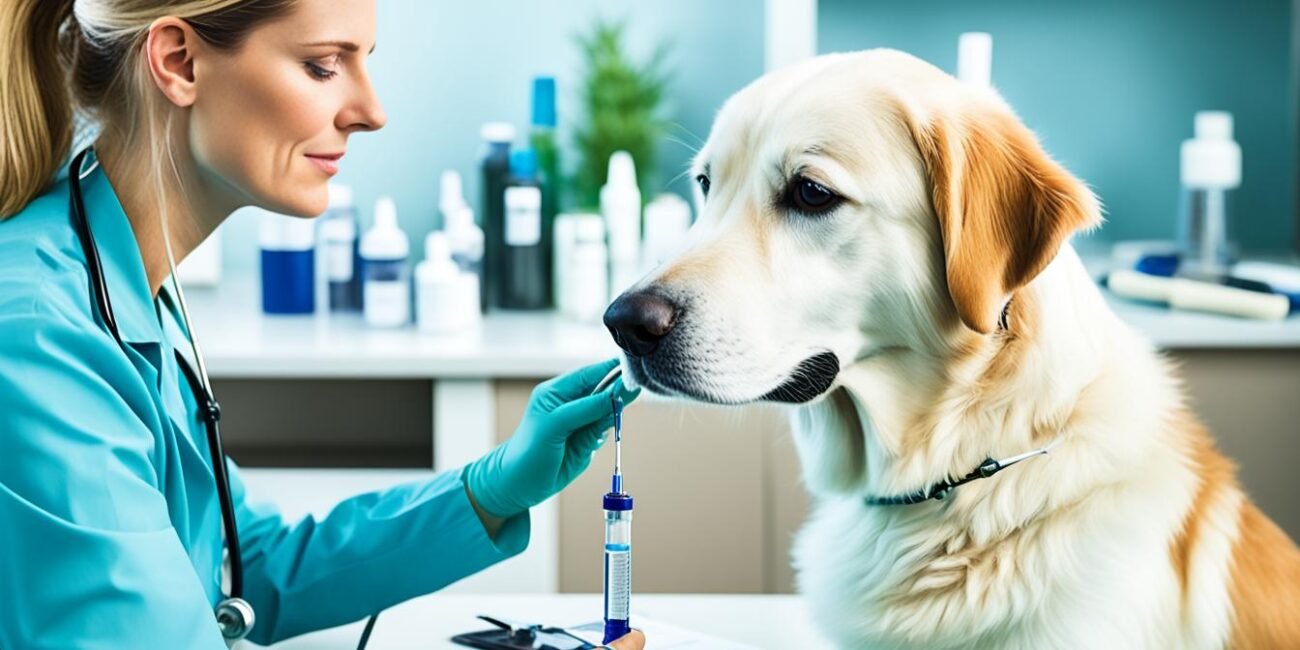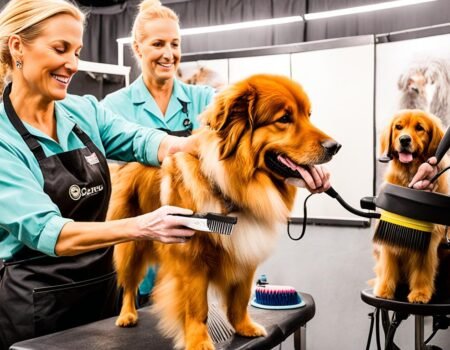Hey it’s J.V. Charles. Have you seen your dog filled with joy and energy, running around without a care? In those moments, our love for them grows even deeper. It reminds us of the duty we have to keep them safe and happy.
But did you know that dogs, like us, can get head injuries and concussions? It’s a serious issue that hit me hard when my dog, Max, got hurt. And this happens to other dogs, sadly.
When I took Max to the vet, I was really scared. I didn’t know what would happen to him. The thought of him not being okay was terrifying. It made me realize how important it is to know about concussions in dogs.
That’s why I want to help you understand this topic. We’ll talk about how to tell if a dog has a concussion, what causes head injuries, and how to help them. This way, we can take better care of our four-legged friends.
“If there is ever a question of my dogs well being, I contact my vet immediately!”- J.V. Charles , Founder DiggityDog.blog
Common Causes of Canine Concussion
Canine concussions happen from many things. Some are more common. It’s important to know these causes to keep dogs safe. We’ll look at what mainly causes canine concussions.
1. Car Accidents
Dogs often get hit by cars in cities. This happens when they are not on a leash. Keeping your dog safe means keeping them on a leash or in a secure area.
2. Falls
Dogs can get concussions from falling off high places. This is dangerous for smaller dogs. Make sure they are in a safe place and are watched.
3. Collisions and Attacks
Concussions can also come from hitting objects or other dogs. Fighting with other animals can be dangerous too. It’s good to teach your dog to get along with others to avoid these risks.
4. Open Fontanelles in Toy Breeds
Some small dogs, like Chihuahuas and Pomeranians, have a soft spot in their skull. This can make them more likely to get concussions. Owners of these dogs need to be extra cautious.
5. Accidental Blows to the Head
Things like baseball bats hitting a dog can cause concussions. Always make the dog’s environment safe. This helps avoid head injuries.
| Causes of Canine Concussion | Common Examples |
|---|---|
| Car Accidents | Being hit by a vehicle while crossing the road. |
| Falls | Taking a tumble from a high surface like a balcony. |
| Collisions and Attacks | Running into another dog during play or being attacked by an aggressive animal. |
| Open Fontanelles in Toy Breeds | Toy breeds with unclosed fontanelles are more prone to concussions. |
| Accidental Blows to the Head | Being struck by a flying object or accidentally hit with an object. |
Knowing these common concussion causes helps dog owners. Being careful is the best way to protect dogs from head injuries.
Recognizing the Symptoms of Canine Concussion
Since dogs can’t tell us how they feel, knowing concussion signs is key. Look out for these signs:
- Problems with balance or walking
- Vomiting
- Anisocoria (when pupils are different sizes)
- Altered level of consciousness or mental state
- Abnormal eye movements
- Disorientation
Notice any of these signs or other strange actions after a bump to the head? Get help fast, especially if your dog fainted. Although the signs might go away, have a vet check to make sure everything’s okay.
“Pet owners must spot concussion signs early and get help. Fast care can save your dog’s health and life.” – Dr. Emily Parker, DVM
What to Do If You Suspect a Concussion in Your Dog
If you think your dog might have hit their head really hard, it’s important to act fast. First, stop any activity they’re doing. Then, take them to a quiet, shady spot. If your pup is awake and seems okay, keep an eye on them for any strange behavior or if they seem to be getting worse.
If there’s any doubt, it’s smart to see the vet. This is especially true if your dog passed out or their mental state is different. When heading to the vet with an injured dog, try to keep their head up a bit. This helps lower the pressure in their head. Don’t grab your dog’s head or neck, it could make things worse. Using something like a stretcher to move them into your car safely is a good idea. It’s also a good move to let the vet know you’re coming. They can be ready and tell you what to do next.
| Tips for Dog Head Injury First Aid: |
|---|
| 1. Stay Calm: It’s important to stay calm and in control to help your dog the best you can. |
| 2. Assess the Situation: Check if your dog is awake, breathing fine, and if there are any cuts or bruises. |
| 3. Stop Bleeding: Use a clean cloth or gauze to put some pressure on any cuts and stop the bleeding. |
| 4. Minimize Movement: Try to keep your dog still to avoid more harm. A leash or a carrier can help with this. |
| 5. Apply Cool Compress: For any bumps or purple spots, a cold pack on the area for 10-15 minutes can help. |
| 6. Do Not Give Medication: It’s not a good idea to give any medicine to your dog without talking to a vet first. |
| 7. Seek Veterinary Care: Get in touch with your vet right away. They’ll tell you what to do next for your dog. |
Treatment and Recovery for Canine Concussions
When a dog gets a concussion, the treatment plan varies based on how bad the injury is. The vet may keep the dog for a while to watch over it and do some tests. They’ll check the dog’s blood pressure, how they’re feeling, and their temperature.
Dogs might get oxygen, fluids through a needle, medicines, and sometimes even surgery. The aim is to treat symptoms, stop more problems, and help the dog get better.
With good care, dogs often recover fully from a concussion. But, you must stick to what the vet says about aftercare and what your dog can do.
Recovery Process for Dogs with Concussions
Getting better from a dog concussion needs patience and time. Your dog should rest a lot and stay in a quiet, peaceful place. Keep your dog from loud sounds, too much playing, or things that might make them worry or scared.
Your vet might also suggest exercises to make your dog stronger and more coordinated. These can be things like keeping their balance, gentle movements, and going around an obstacle course.
Seeing your vet often lets them check how your dog is doing and change their care plan if needed. These visits also give you a chance to ask questions or talk about any worries you have.
Prognosis for Dogs with Concussions
The chance that a dog will get better from a concussion depends on how bad it was and the dog’s health. Mostly, with the right care and rest, dogs get well.
Yet, some might have issues like fits, behavior changes, or trouble thinking. It’s very important to keep watching your dog’s progress and tell your vet about any worries.
Each dog’s recovery is different, so talk with your vet. They’ll give you the best advice for helping your dog get better and stay healthy.
| Treatment Options for Canine Concussions | Recovery Strategies | Prognosis |
|---|---|---|
| Oxygen therapy | Rest and a stress-free environment | Full recovery possible with proper care |
| Intravenous fluids | Physical therapy and rehabilitation exercises | Long-term effects or complications may occur |
| Diuretics | Regular check-ups and follow-up care | Prognosis varies depending on the severity |
| Corticosteroids | Close monitoring and reporting of changes to the veterinarian | Individual dog’s overall health plays a role |
| Surgery (in severe cases) |
Conclusion
In short, dogs can get concussions just like people. It’s key for dog owners to know the signs of a head injury. If you think your dog has a concussion, getting fast help is very important. Early care can stop more problems and help your dog get better.
Preventing head injuries is very important. Keeping your dog safe means avoiding risky areas like roads or heights. Make sure your dog has a safe place to play. This can reduce the chance of them getting hurt.
Always talk to a vet for the best advice on keeping your dog healthy. They’ll give tips based on your dog’s type, age, and health. Being careful and looking out for your dog’s safety can keep them happy and well.
FAQ
Can dogs get concussions?
Yes, just like people, dogs can get concussions and brain injuries.
What are the common causes of canine concussions?
Vehicle accidents, high falls, hitting other dogs or things, and animal attacks are common causes.
What are the signs of a concussion in dogs?
Signs include trouble walking, vomiting, and pupils of unequal size. They may act confused and have odd eye movements.
What should I do if I suspect my dog has a concussion?
If you think your dog has a concussion, stop their activities. Move them to a quiet place. Then, have a vet check them out.
How are canine concussions treated and what is the recovery process?
Treatment and recovery differ by injury. Vets watch the dog closely. They may give oxygen, fluids, or medicine. Many dogs fully recover with the right care.
Can I prevent canine concussions?
You can’t avoid all dog head injuries. But, keeping your dog on a leash and from risky areas helps.
Any final thoughts on canine concussions?
Knowing concussion signs is key for dog owners. Quick vet help is vital. It stops more problems and aids the dog’s recovery











No Comment! Be the first one.